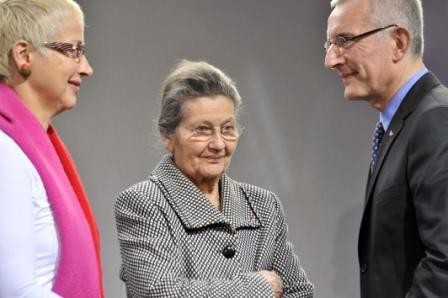The French-American Foundation Weekly Brief

France signed an agreement with Russia on Tuesday, January 25, to sell four Mistral helicopter carriers, Bloomberg reported. The deal, initially announced in December, included the sale of at least two ships, which cost up to €500 million each. The signing took place at the headquarters of the maker of the war ships, STX, in Saint Nazaire, where the first two ships will be constructed with 20 to 40 percent of the crew supplied by Russia, according to Le Figaro. The following two ships will be constructed on Kotlin Island in Saint Petersburg, according to Pravda. The deal, overseen by President Nicolas Sarkozy and signed by French Defense Minister Alain Juppé and Russian Vice Prime Minister Igor Sechin, creates about 5 million hours of work for France or about four years of full-time employment for 1,000 French people, according to La Tribune. However, the deal, the first sale of military materials between a NATO nation and Russia, has caused controversy in the international community. The United States and NATO have joined ex-Soviet states in voicing concern about the growth of Russia’s military, particularly following Russia’s brief war with the Republic of Georgia in 2008.
While in Saint Nazaire, President Nicolas Sarkozy announced on Tuesday, January 25, that France was seeking bids for a €10-billion for the construction of the nation’s first offshore wind-power facilities, AFP reported. France, which currently brings 74 percent of its energy from aging nuclear reactors, hopes to catch up with its European neighbors by building 600 offshore wind turbines by 2015 with a capacity of 3,000 megawatts, according to Reuters. Ecology Minister Nathalie Kosciusko-Morizet elaborated that France plans to double its usage of wind energy by 2020, making the 10-year investment about €20 billion. With a capacity of 6,000 MW, the 1,200 turbines projected for 2020 would supply about 3.5 percent of energy in France, according to Le Point. Likely candidates for the project include German Siemens and Danish Vestas. Sarkozy said the selected partner for the project would be announced in early 2012. The construction projects have been planned for the western regions of the Loire, Bretagne, and Normandie.
Boris Boillon, who served two years as a diplomatic adviser on the Middle East and North Africa to President Nicolas Sarkozy, was named as the new ambassador to Tunisia on Wednesday, January 26, replacing Pierre Ménat, the New York Times reported. At 41, Boillon, who is currently ambassador to Iraq, is France’s youngest ambassador. Government spokesperson François Baroin said that Boillon, as a speaker of Arabic and specialist in the region was a natural choice to handle “a new era in Franco-Tunisian relations,” according to Reuters. The announcement came two days after Sarkozy said in a speech to journalists on Monday, January 24, that his administration had underestimated the popular uprising that led to the departure of ex-President Zine al-Abidine Ben Ali on January 14 to Saudi Arabia. Sarkozy and Foreign Minister Michèle Alliot-Marie have been heavily criticized in France for their complacence with the authoritarian regime and Alliot-Marie’s contribution to the Tunisian police control of mass protests, which has been deemed overly violent by the international community. L’Express explored Boillon’s challenges to repair fragile relations between France and its past colony.
The national French railway system, SNCF, made its first formal public apology to Holocaust survivors on Tuesday, January 25, acknowledging its role in the deportation of thousands of Jews during World War II to Nazi death camps, the New York Times reported. The memorial took place at the Drancy train station in the town of Bobigny, where SNCF met with Simone Veil, honorary president of the Foundation for the Memory of the Shoah and herself a deportee, and the mayor to designate the station as an official memorial to those deported from France, according to L’Humanité. The apology came after pressure mounted from Jewish organization in the United States, who wanted to block deals with SNCF to construct high-speed train systems in the states of Florida and California, due to the company’s refusal to acknowledge its participation in the Holocaust, Le Figaro reported. SNCF had previously acknowledged that it was forced to transport some 75,000 Jews to death camps but cited the fact that hundreds of its employees were murdered for resisting Nazi occupiers in defending its actions, according to AFP. The memorial comes as a continuation of France’s acknowledgement of participation in the Holocaust, following then President Jacques Chirac’s 1995 acknowledgement that the Vichy Regime collaborated with the Nazis and even SNCF’s opening of archives of all wartime materials in 1996.
Rwandan Callixte Mbarushimana, suspected of eleven charges of crimes against humanity and war crimes for his participation in the systematic rape, torture, and murder of Congolese people by the FDLR Hutu rebel group, was transferred from Paris to the Hague on Tuesday, January 25, AFP reported. Mbarushimana was arrested in Paris on October 11 and has been under investigation there for his role in the planning of the 2009 terror movement and even for potential participation in the 1994 genocide in which 800,000 Tutsi and moderate Hutu were murdered, according to Le Parisien. The transfer of Mbarushimana is the first time France has extradited anyone to the International Criminal Court since the ICC was founded in 2002, according to the Financial Times. Mbarushimana’s official criminal proceedings begin on Friday, January 28.
Share to: Facebook Twitter LinkedIn Email
Leave a reply
Your email address will not be published. Required fields are marked *



